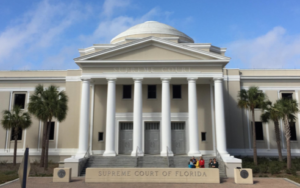By John Haughey
The Center Square
December 6, 2019
 Florida’s Republican and Democratic parties joined Attorney General Ashley Moody Tuesday in arguing before the Supreme Court that a proposed “open” primary constitutional amendment is too complicated for voters and should be removed from the 2020 ballot.
Florida’s Republican and Democratic parties joined Attorney General Ashley Moody Tuesday in arguing before the Supreme Court that a proposed “open” primary constitutional amendment is too complicated for voters and should be removed from the 2020 ballot.
“The key here is that the amendment is redefining what has been in place for over a century in this state of what a party nominee is,” Florida GOP attorney Benjamin Gibson told justices.
Chief Justice Charles Canady and Justice Alan Lawson did not seem convinced that Floridians would be unable to understand the measure’s language or the “jungle” primary system it espouses.
“We don’t knock things off the ballot unless they’re clearly and conclusively defective,” Canady said.
“You read the [ballot] summary and give it a few seconds of thought, you’re going to realize the implications of it, it seems to me,” Lawson said. “And I’m just struggling as to why that’s not true.”
Tuesday’s Supreme Court review of the measure’s language is a mandatory step in getting proposed constitutional amendments before voters.
Sponsored by Tallahassee-based All Voters Vote (AVV), the measure became the second petition-driven initiative to qualify for the November 2020 ballot last month when it surpassed the required 766,200 certified voter signatures.
As of Tuesday, the measure had secured 768,276 signatures and AVV had received more than $6.9 million in contributions – about $6.6 million since November 2018 – raised in a campaign led by Miami health-care executive Mike Fernandez.
Florida is one of nine states with “closed” primary elections limited exclusively to party-registered voters, but if 60 percent of voters approve the AVA’s measure, all registered voters would be eligible to cast ballots in “open” primary elections for state Legislature, governor and cabinet, regardless of political affiliation. It would not apply to Congressional and Senate elections.
The two candidates getting the most votes in each “open” primary would advance to the general election – a “jungle” system similar to California’s.
Parties could still select nominees, but other members of the same party could qualify for the primary ballot, whether state party leadership liked it or not. That rankled attorneys for both parties.
“The chief purpose of this amendment is to abolish party primaries in order to set up a mechanism to elect more moderate candidates,” Florida Democratic Party Robert McNeely said.
Citing a statement in the measure’s summary – “All candidates for an office, including party nominated candidates, appear on the same primary ballot” – Justice Carlos Muniz said it was unclear to him how that would happen.
“The summary doesn’t tell you how the status quo is going to be changed because we don’t know how it’s going to be changed, right?” he asked AVV Chair Glenn Burhans, Jr. “You don’t know how the parties are going to nominate people, if at all. You couldn’t. And that’s a huge, core aspect of the way we do things now.”
Among ways parties could adjust to the “open” primary scenario is to stage “pre-primaries” with top vote-getters moving to the primary elections.
Muniz said that aspect of the proposal may need more certainty for voters to understand the measure’s full ramifications.
Burhan told reporters after Tuesday’s hearing that primaries are dominated by “a small sliver of the extreme wing of either party” and often determine the winners of elections in many areas of the state.
Under AVA’s proposal, candidates “have to go to the primary and appeal to a much broader swath of the electorate,” he said. “They are going to be forced to moderate their bad behavior, and they are going to be forced to take action and speak to the greatest number of voters in order to win elections.”
Of the six petition-driven campaigns that have met preliminary qualifications for a Supreme Court review, Moody has legally challenged four.
The others opposed by the state’s AG Office are prospective amendments seeking to legalize recreational marijuana, ban “assault weapons” and deregulate the energy industry.
None have secured the required 766,200 certified voter signatures to qualify for the November 2020 ballot, which must be presented to the state’s Division of Elections by Feb. 1.
Florida For A Fair Wage’s proposed constitutional amendment to raise the state’s minimum wage to $15 an hour by 2026 became the first measure to qualify for the 2020 ballot in October.
